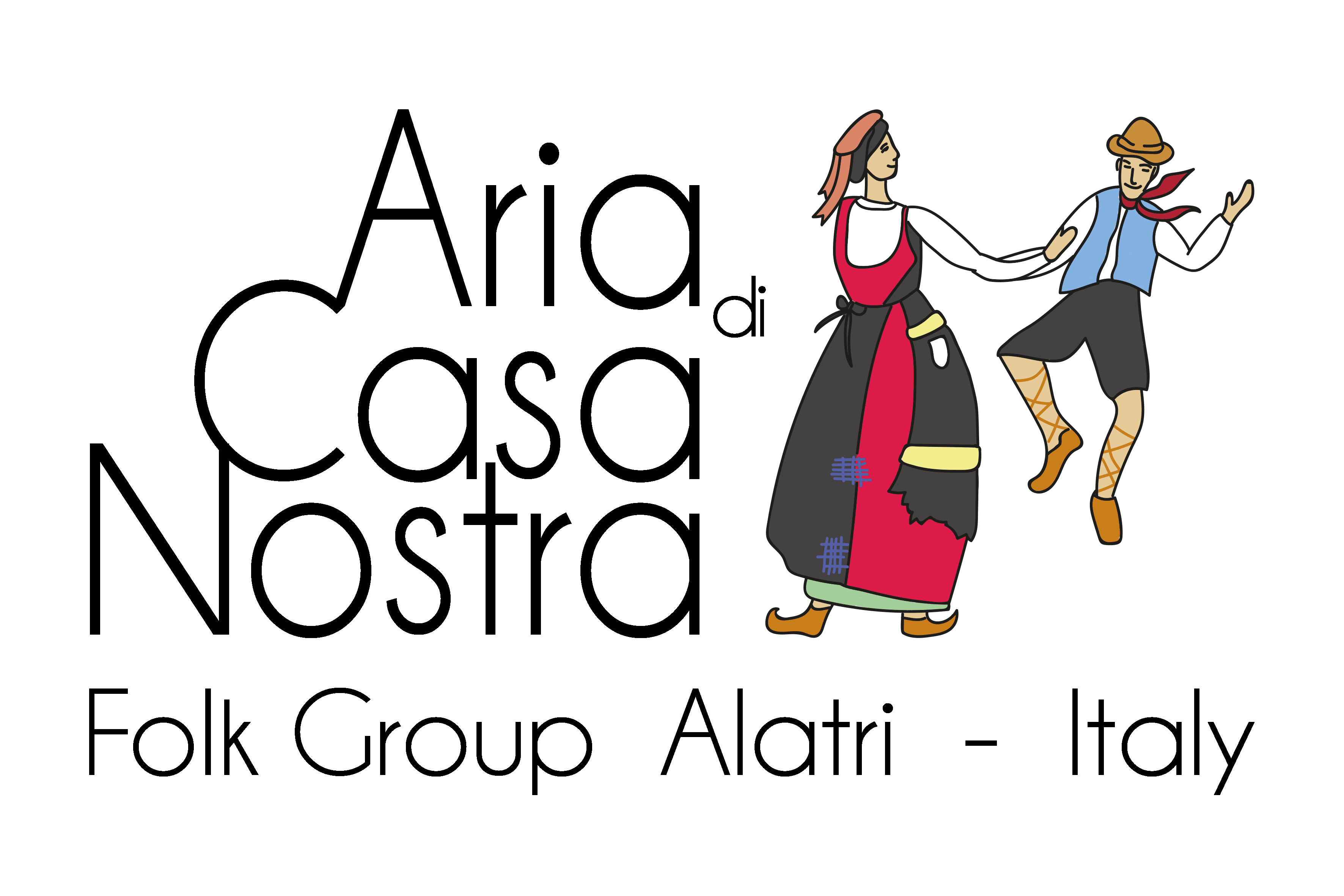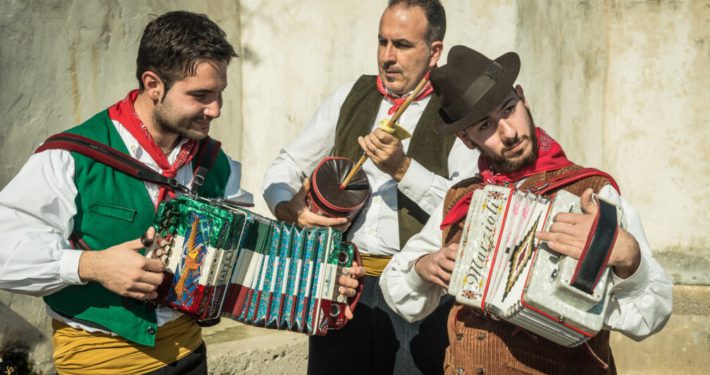TRADITIONAL SONGS
Aria di Casa Nostra performs a classic ciociaro repertoire, often accompanied by interpretations left in inheritance by the intense relationships with neighboring regions.
Work in the fields, love, marriage and religious passion are just some of the main themes that can be found in the texts.
Often, in the so-called “stornelli a dispetto”, teasing and mocking the boss: jokes between men, but also jokes addressed to women and their sensuality.
The group also engages in the interpretation of songs from Neapolitan and Roman folklore such as’ O sole mio, Torna a Surriento, Rome nun makes the stupid tonight, etc. .. Performed mainly abroad, these songs flank the most typical of Ciociaria.
The oral testimonies, together with the musical ones, make up the silent background of the entire repertoire.
Some of the pieces are taken from the collection that the Luigi Colacicchi presented at the “Congresso di Trento” in 1936. Others from the collection “Accusì canta la Ciuciaria”, written by Mr. Flavio Fiorletta.
The words and music of the Alatrian songs “L’Arca”, “Gli Culacchiegli”, “Juccia”, “La cipolla”, “La tesserella”, “La ciammotta”, were written in 1900 by Gerardo Celebrini and Giovanni Ricciotti on the occasion of the Maddalena Fair that occurs on July 22nd.
Stornelli Ciociari
They are mainly performed with the “two-barrel” organ and a competition is often established between the performers and those who recite it more. In the performances, the folk group performs these typical “Stornelli” also as a mode of charge. Some verses are handed down by tradition.
I quand la ciuciara s’ marita i chi ci dà gli spag i chi la ciocia
I quand la ciuciara è maritata gli spag è rutt i la ciocia sfunnata (sfasciata)I chissi della valla n’gli vogli perche me fo’ magna cipolla i agli
Purchè m’ fo’ magna’ cipolla i agli, i la ‘nsalata senza sal’ i ogliTe la si fatta fa dentr’alla stalla pe testimone c’era la cavalla
Ma statt’ zitt’ tu st’ cos’ storto, ‘nzi bon’ manc’ pe cancegli agli orto
Ma statt’ zitt’ tu uocca ruperta, rupun’t sta occa p’ l’ fiche fatt’
Ma statte zitto tu ca nun sai cantane, araglia megli ‘n asini ca tuneE io de stornelli ne so’ tanti, e chi ne sa di più se faccia avanti
Nun te mette cu mi ca nun la vinci, so nato alla bucetta degli aranci
So nato alla bucetta degli aranci i alla vituccia tea ci facci a cinciAlla vituccia tea ci facci a cinci i a chella mea ci poto gli vinghi
All’acqua all’acqua friccicarella, la conca gira i gli suregli balla
La tesserella
A wife thinks of her husband away while “weaving” the loom. [Words of G. Celebrini music by G. Ricciotti]
Vòla la spola, gli tempo nun và: me mòro, me mòro nun pozzo campà. Dalla sera a lla dumane stòngo sorc’a cralemà stòngo sola agli telaro, zica tela a rattramà…
Nun me tucca’ la zampa
Timid approach between lovers. [popular song of probable importation, learned by tradition; perhaps the version “At midnight on the dot” documented in 1928 was its inspiration]
Nun me tuccà la zampa quande la mamma ne vede te facci segni cu i pede quando me teta tuccà…
La ciammotta
The lover declares himself to the beloved on the occasion of the feast of St. John, a day notoriously dedicated, to the tasting of snails. [Words of G. Celebrini music by G. Ricciotti]
Magna magna la bella ciammotta comm’è bianca, che bella macoca, da lla scorcia vè jecco la cacci, magnatèlla pu mmi, Mariannì! Je stong n’paradiso quand stongo cu tti! su Marianni’ abbracciami, me sento da murì!
Carl’Antonio e la zitella
Courting song of courtship between lovers. [Originally, solo without accompaniment; collected in 1934 in the district of S. Filippo in the Villa Pagani of Veroli, which was its executor. Learned by tradition – Elab. Luigi Colacicchi]
Dove t’ha pizzicato la tarantella a te? Carl’Antonio e la zitella l’ha pizzicato la tarantella…
Ninna Nanna di Alatri
Sweet lullaby of a mother who, though busy in her housework, takes care of her baby, swinging her cradle, resting on the ground. [Words and music by Luigi Fiorletta]
I tutte e sere, mbracci a mamma bella, me cunsulava a resmirà na stella…
La pasema
Song dedicated to the beloved [Words and Music by Achille Gussati, former music director of the group].
… teng’ na’ pasema n’pett’ massera p’ vidette, quando vai a toll l’acqua alla funtana abball’…
Me so ficcata na spina agli core
A disappointed lover; his beautiful has decided to grant his thanks to the rival in love. [Solo and choral with organ accompaniment or without. Generic. Harvested in 1934. Elab. L.Colacicchi]
Me’ so ficcata na spina agli còre, ‘na ponta c’è rimasta e me dà guaie…
Ohi li, Ohi là
Love follows the course of the seasons. [Solo and choral with organ accompaniment or without. Generic. Collected in 1934 in the Sorano. Proc. Luigi Colacicchi]
Mo ch’è giunta primavera ogni ceglio fa gli nido, ogni donna vuole marito, ma non ce se po’ negà Ohi li, Ohi la…
Juccia
A hopeful sweetheart that the girl thinks of it. [Words of G. Celebrini music by G. Ricciotti]
Drent’a chessa baracca agliuminate, te vide sse mucchitto ‘nculore de rosa, Tu, Juccia mè, che stai tutta pensosa forcia suspiri i penzi carch’ a mì?… O Juccia mè, sì ‘n angigli la fata dè sto core. Pu tti, bella, m’enteseche Je me strui d’amore…
Maria Necola
Maria Necola, beautiful and coveted, but … remained a spinster. [Solo and choral with organ accompaniment or without. Generic. Collected in 1934. Executing Vincenza Matteucci in Lisi called “La Cenese”, storytellers in the fairs of the region. Accompagnatore all’impetto the figlistro D.Lisi, also storytellers. Learned by tradition Elab. L.Colacicchi].
…Te si’ fatte ie riccie n’fronta chi te ‘ialliscia e chi te i’apponta pour’a tte Maria necò- Maria Necòla mia chi te l’è fatte fà.. eri ‘na bella pedecona te putivi marità…
La Cipolla
Homage to a typical vegetable of rural life. [Words of G. Celebrini music by G. Ricciotti].
Itè com’è ruscetta sta cipolla è quasi tonna accom’ a ne prucoco, sotto alla urunza se mette agli foco, più doci dell’ zuccher se fa….
La Campagnola
The difficult “conquest” of the beautiful country girl. [Solo and choral, without accompaniment; collected at a popular gathering of Fiuggi in 1934. A group of commoners and girls of the bourgeoisie were executing. Proc. L. Colacicchi].
Che bei capelli che tiè ‘sta campagnola. Ma la votatoja ‘lla via nova la campagnola morire mi fa…
Me pizzica me mozzica
The “itch” of love … [Solo, without accompaniment. Generic. Collected in 1932 performer Vincenzo Olevano, cantiniere, called “Pacchiarot ‘” and “l’ammentario” (from ammentor, inventor, that is improviser of occasional verses). Learned by tradition. Proc. L.Colacicchi].
So’ pizzichi d’amore, bella non fanno male! Me pizzica, me mozzica..
Struppuletta degli spuse
The resentment of a betrayed wife … [Solo and choral with organ accompaniment or without. Generic. Collected in 1934 in the Sorano. Proc. Luigi Colacicchi]
Jemm’ alla Chiesia a fa’ gli giurament, amore mio sem tutt’e due cuntent, chella gnuranta che avete portata mio caro amore mi avete abbandonata..
Gli culacchiegli
A girl, already busy, drives off an intrusive suitor. [Words of G. Celebrini music by G. Ricciotti]
…’sto core è de Ciuccitto i pu duspetto tè! Vattenne, brutto Cifere, nun te pozzo vide!… Curi curi a lle tridici preti, quanno ‘nciocca te vè sa vuleia. Tocca, scriate, figli de sdreja, i ecco ‘n paci a mi lassèma stà!
La mamma del mio amor
The mother-in-law, … not particularly loved [Solo, without accompaniment. Generic. Harvested in 1931. Executing Lucia Del Monte; maid and housewife learned from her mother Maria. Proc. L. Colacicchi]
…La mamma del mio amor le cortellate facitecele grosse le ferite…
L’ero fatto un bel cappello
The embellishments … to “conquer” the boyfriend. [Solo and choral, without accompaniment; collected at a popular gathering of Fiuggi in 1934. A group of commoners and girls of the bourgeoisie were executing. Proc. L. Colacicchi].
L’ero fatto un bel cappello l’ero fatto bellino pe te ho saputo che sei un monello il bel cappello lo tengo pe me…
Felice e Mariola
Singing to the spouses. [Soloist, with organ accompaniment or without. Generic. Collected in 1934 Silverio Calicchia performer. Learned by tradition. Proc. L.Colacicchi].
…O’ compare non t’assora, ca passe i guaie. ca passe guaie Felice e Mariola ohi Raffaele ridacce la parpagnola.
E le Femmene ‘e Valmunton
Women with the “concone”. [Solitary, without accompaniment. Harvested in 1931. Executing Lucia Del Monte; maid and housewife learned from her mother Maria. Learned by tradition from the farmers. Proc. L.Colacicchi].
I Le Femmene ‘e Valmunton vanno a casa cu gli cunone…
Rusì Rusì
Dedication to the beloved on the occasion of the feast of Mary Magdalene [Words by G. Celebrini and music by A. Ciarrapica].
Quanne la sera iesci alla funtana te vide tutta bella i azzullummata cu chella giaccarella arrecamata me sent tutt’ dentro frelegà



